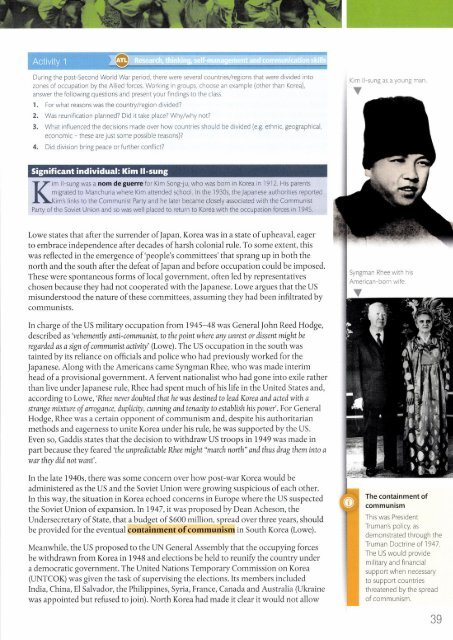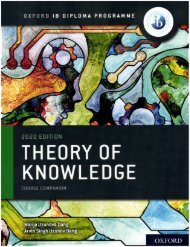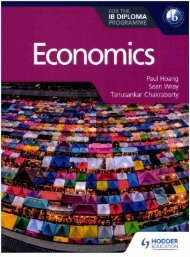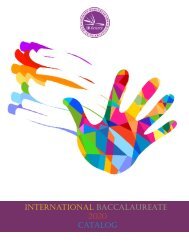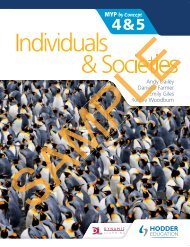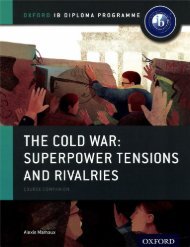SHELF 9780435183127 HISTORY PAPER 3 THE COLD WAR AND THE AMERICAS (1945-1981) STUDENT 60p
SHELF 9780435183127 HISTORY PAPER 3 THE COLD WAR AND THE AMERICAS (1945-1981) STUDENT 60p
SHELF 9780435183127 HISTORY PAPER 3 THE COLD WAR AND THE AMERICAS (1945-1981) STUDENT 60p
You also want an ePaper? Increase the reach of your titles
YUMPU automatically turns print PDFs into web optimized ePapers that Google loves.
Dur ng the post-Second World War period, there were seveTa countries/regions that were dlvlded into<br />
zones of occupat on by the A lled forces. Working in groups, choose an example (other than Korea),<br />
answer the fol owing questions and present your findings to the class.<br />
1. For what reasons was the country/reg on divided?<br />
2. Was reunlf cation planned? Did t take place? Why/why not?<br />
3. What influenced the decisions made over how countr es should be divided (e.g. ethnic, geographrcal,<br />
economic - these are;ust some possib e reasons)?<br />
4. Dld divlsion bring peace or further confllct?<br />
Kim ! sung as a young man<br />
Y<br />
T 7 m ll sung was a nom de guerre for Kim Song-ju, who was born in Korea in 1912. His parents<br />
K<br />
I\ri#r lrnks to the Communist Party and he later became closely associated with the Communist<br />
nst;;"dlolvlanrl"rrrrawhe.eKirattenoedschoo.Intl'e,l930s rl'eJapaneseaulloritiesreported<br />
Party of the Soviet Union and so was well placed lo return to Koreawith the occupation lorces in ,<strong>1945</strong>.<br />
Lowe states that after the surrender of iapan, Korea was in a state of upheaval, eager<br />
to embrace independence after decades of harsh colonial rule. To some extent, this<br />
was reflected in the emergence of 'people's committees'that sprang up in both the<br />
north and the south after the defeat oflapan and before occupation could be imposed.<br />
These were spontaneous forms of local government, often led by representatives<br />
chosen because they had not cooperated with the lapanese. Lowe argues that the US<br />
misunderstood the nature of these committees, assuming they had been infiltrated by<br />
communists.<br />
Syngman Rhee w th h s<br />
Amercan-born wrfe.<br />
Y<br />
In charge of the US military occupation from <strong>1945</strong>-48 was General )ohn Reed Hodge,<br />
described as 'vehemently anti-communist, to the point where any unrest or dissent might be<br />
regarded as a sign of communist activigt' (Lowe). The US occupation in the south was<br />
tainted by its reliance on officials and police who had previously worked for the<br />
)apanese. Along with the Americans came Syngman Rhee, who was made interim<br />
head of a provisional government. A fervent nationalist who had gone into exile rather<br />
than live under)apanese rule, Rhee had spent much of his life in the United States and,<br />
according to Lowe, 'Rhee never doubted that he was destined to lead Korea and acted with a<br />
strange mixture of anogance, dupliciq,, cunning and tenaciqt tu establishhis power'. For General<br />
Hodge, Rhee was a certain opponent of communism and, despite his authoritarian<br />
methods and eagerness to unite Korea under his rule, he was supported by the US.<br />
Even so, Gaddis states that the decision to withdraw US troops in 1949 was made in<br />
part because they feared 'the unpredictable Rhee might "march north" and thus drag them into a<br />
war they did not want' .<br />
In the late 1940s, there was some concern over how post-war Korea would be<br />
administered as the US and the Soviet Union were growing suspicious of each other.<br />
In this way, the situation in Korea echoed concerns in Europe where the US suspected<br />
the Soviet Union of expansion. In1947, it was proposed by Dean Acheson, the<br />
Undersecretary of State, that a budget of $600 million, spread over three years, should<br />
be provided for the eventual containment of communism in South Korea (Lowe).<br />
Meanwhile, the US proposed to the UN General Assembly that the occupying forces<br />
be withdrawn from Korea in 1948 and elections be held to reunify the country under<br />
a democratic government. The United Nations Temporary Commission on Korea<br />
(UNTCOK) was given the task of supervising the elections. Its members included<br />
India, China, El Salvador, the Philippines, Syria, France, Canada and Australia (Ukraine<br />
was appointed but refused to join). North Korea had made it clear it would not allow<br />
The containment of<br />
communism<br />
This was President<br />
Truman's policy, as<br />
demonstrated through the<br />
Truman Doctrine of 1941<br />
The US would provide<br />
m litary and financial<br />
support when necessary<br />
to support countries<br />
threatened by the spread<br />
of communlsm.<br />
3g


